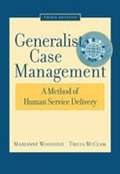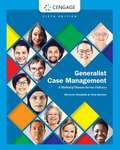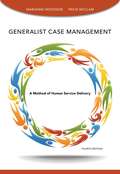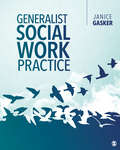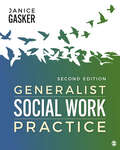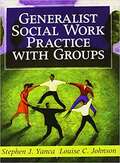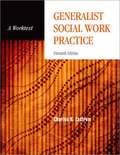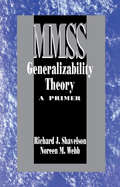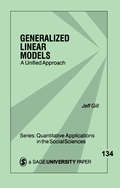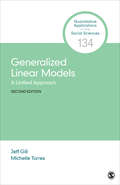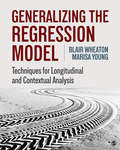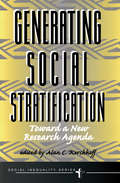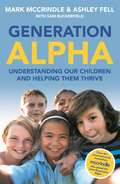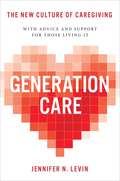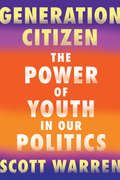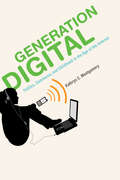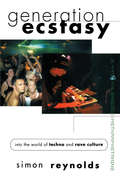- Table View
- List View
Generalist Case Management: A Method of Human Service Delivery
by Tricia Mcclam Marianne R. WoodsideGoing beyond traditional definitions of case management, the authors (of the U. of Tennessee) suggest a broader perspective that sees a greater emphasis on its role in service delivery in the human services. In this introduction to case management, they describe the case management process from intake interview to termination; examine professional issues and skills, discuss the history of case management, and describe the models used. They also cover ethical and legal issues and conclude with a chapter on managing a career as a case manager. Annotation ©2005 Book News, Inc., Portland, OR (booknews.com)
Generalist Case Management: A Method of Human Service Delivery
by Marianne Woodside Tricia McClamBecome an effective case manager with GENERALIST CASE MANAGEMENT: A METHOD OF HUMAN SERVICE DELIVERY, 5th Edition. You'll be drawn into the text early on when you meet Sharon Bello, a client involved in the case management process. Realistic and relevant, this text provides you with the fundamental skills and information you need to coordinate and provide services to a variety of populations. Case studies, interviews with human service case managers nationwide, and opportunities to apply what you learn to real-life issues are just a few of the tools that will help you become an effective advocate for your client. You'll also gain practical knowledge to help you prepare for earning C-SWMC certification and the HS-BCP credential.
Generalist Case Management: A Method of Human Service Delivery (Fourth Edition)
by Marianne Woodside Tricia McclamBecome an effective case manager with GENERALIST CASE MANAGEMENT: A METHOD OF HUMAN SERVICE DELIVERY, 4th Edition. Realistic and relevant, this counseling book provides you with the fundamental skills and information you need to coordinate and provide services to a variety of populations. Case studies, interviews with human service case managers nationwide, and opportunities to apply what you learn to real-life issues are just a few of the tools that will help you become an effective advocate for your client.
Generalist Practice, second edition: A Task-Centered Approach
by Tolson Eleanor Reardon William J. Reid Charles D. Garvin.This basic textbook seeks to establish a "task-centered" methodology--a structured, short-term, problem-solving approach--applicable across systems at five levels of practice: the individual, the family, the group, organizations, and communities. The second edition offers more information on systems theories and includes case studies with each chapter. Checklists are provided for each level of practice along with questions for consideration and practice exercises to help students monitor their understanding and skill development.
Generalist Practice: A Task-Centered Approach
by William J. Reid Eleanor Reardon Tolson Charles GarvinThis essential text presents a "task-centered" methodology—a structured, short-term problem-solving approach—applicable across systems at five levels of practice: the individual, the family, the group, organizations, and communities. The second edition offers more information on systems theories and includes case studies and practice questions with each chapter, as well as checklists for each level of practice and exercises to help students monitor their understanding and skill development.
Generalist Social Work Practice
by Janice A. GaskerGeneralist Social Work Practice provides students with the foundational skills and knowledge needed to serve clients across micro, mezzo and macro areas of practice. Author Janice Gasker brings a focus on self-reflection as the first stage in the planned change process and writes with the perspective that we consider work at all levels of practice simultaneously rather than in isolation. In accordance with the 2015 Educational Policy and Accreditation Standards (EPAS) set forth by the Council of Social Work Education (CSWE), the planned change process is presented as dynamic and interactive, providing students with a clear understanding of how each stage of the planned change process can be utilized at any point when serving a client system. The text spotlights the distinctive characteristics of the worker—their values, attitudes, and experiences—that may influence client interaction. The text also includes case studies, collaborative learning exercises, and critical thinking questions to help students apply concepts to practice.
Generalist Social Work Practice
by Janice A. GaskerGeneralist Social Work Practice provides students with the foundational skills and knowledge needed to serve clients across micro, mezzo and macro areas of practice. Author Janice Gasker brings a focus on self-reflection as the first stage in the planned change process and writes with the perspective that we consider work at all levels of practice simultaneously rather than in isolation. In accordance with the 2015 Educational Policy and Accreditation Standards (EPAS) set forth by the Council of Social Work Education (CSWE), the planned change process is presented as dynamic and interactive, providing students with a clear understanding of how each stage of the planned change process can be utilized at any point when serving a client system. The text spotlights the distinctive characteristics of the worker—their values, attitudes, and experiences—that may influence client interaction. The text also includes case studies, collaborative learning exercises, and critical thinking questions to help students apply concepts to practice.
Generalist Social Work Practice
by Janice A. GaskerGeneralist Social Work Practice provides students with the foundational skills and knowledge needed to serve clients across micro, mezzo and macro areas of practice. Author Janice Gasker engages students through evidence-based pedagogy, self-reflection opportunities, application and reinforcement of concepts, and an abundance of critical thinking sections, including profession practice standards such as the 2018 NASW Code of Ethics and 2022 EPAS. Updates to the Second Edition include an emphasis on Critical Race Theory, greater coverage of issues related to race and intersectionality, and a new section on institutional racism in social work. Included with this title: LMS Cartridge: Import this title’s instructor resources into your school’s learning management system (LMS) and save time. Don’t use an LMS? You can still access all of the same online resources for this title via the password-protected Instructor Resource Site. Learn more.
Generalist Social Work Practice
by Janice A. GaskerGeneralist Social Work Practice provides students with the foundational skills and knowledge needed to serve clients across micro, mezzo and macro areas of practice. Author Janice Gasker engages students through evidence-based pedagogy, self-reflection opportunities, application and reinforcement of concepts, and an abundance of critical thinking sections, including profession practice standards such as the 2018 NASW Code of Ethics and 2022 EPAS. Updates to the Second Edition include an emphasis on Critical Race Theory, greater coverage of issues related to race and intersectionality, and a new section on institutional racism in social work. Included with this title: LMS Cartridge: Import this title’s instructor resources into your school’s learning management system (LMS) and save time. Don’t use an LMS? You can still access all of the same online resources for this title via the password-protected Instructor Resource Site. Learn more.
Generalist Social Work Practice With Groups
by Louise C. Johnson Stephen J. YancaExamining all aspects of group work that generalist social workers are likely to encounter, Generalist Social Work Practice with Groups uses a practical and applied approach to show how to effectively form and facilitate groups. It is the third in a series of generalist texts by Stephen Yanca and Louise Johnson that uses the authors’ generalist model with individuals, families, groups, organizations, and communities.
Generalist Social Work Practice: A Worktext
by Charles ZastrowCharles Zastrow-a leader in the field for over forty years-combines the key components of traditional and contemporary approaches to teaching social work practice into one comprehensive volume in the 11th edition of Generalist Social Work Practice. From the history of social work and the ethics of practice, to the modern approaches to self care and asset-based community development-this extensive worktext presents the knowledge, values, and skills needed for entry-level social work practice. Zastrow emphasizes the importance of counseling in various practice settings by including the Counseling Theories Resource Manual (CTRM), a series of modules that presents and critiques the prominent theories of counseling that are widely used by social workers, including reality therapy, rational therapy, behavior therapy, as well as specific intervention techniques useful in working with individuals, treatment groups, and families. Structured for use at the undergraduate and graduate level, this book provides the theoretical and practical knowledge needed for students to become change agents.
Generalizability Theory: A Primer
by Dr Richard J. Shavelson Noreen M. WebbIn this volume, Shavelson and Webb offer an intuitive development of generalizability theory and cover a wide variety of topics such as generalizability studies with nested facets and with fixed facets, measurement error and generalizability coefficients, and decision studies with same and with different designs. Detailed illustrations, examples and exercises all serve to clearly describe the logic underlying major concepts in generalizability theory and assist readers in applying these methods when investigating the consistency of their own measurements.
Generalized Linear Models: A Unified Approach
by Professor Jeff GillThe author explains the theoretical underpinnings of generalized linear models so that researchers can decide how to select the best way to adapt their data for this type of analysis. Examples are provided to illustrate the application of GLM to actual data and the author includes his Web address where additional resources can be found.
Generalized Linear Models: A Unified Approach (Quantitative Applications in the Social Sciences #134)
by Jefferson M. Gill Silvia Michelle Torres PachecoGeneralized Linear Models: A Unified Approach provides an introduction to and overview of GLMs, with each chapter carefully laying the groundwork for the next. The Second Edition provides examples using real data from multiple fields in the social sciences such as psychology, education, economics, and political science, including data on voting intentions in the 2016 U.S. Republican presidential primaries. The Second Edition also strengthens material on the exponential family form, including a new discussion on the multinomial distribution; adds more information on how to interpret results and make inferences in the chapter on estimation procedures; and has a new section on extensions to generalized linear models. Software scripts, supporting documentation, data for the examples, and some extended mathematical derivations are available on the authors’ websites as well as through the \texttt{R} package \texttt{GLMpack}. Supporting material (data and code) to replicate the examples in the book can be found in the ′GLMpack′ package on CRAN or on the website&
Generalized Linear Models: A Unified Approach (Quantitative Applications in the Social Sciences #134)
by Jefferson M. Gill Silvia Michelle Torres PachecoGeneralized Linear Models: A Unified Approach provides an introduction to and overview of GLMs, with each chapter carefully laying the groundwork for the next. The Second Edition provides examples using real data from multiple fields in the social sciences such as psychology, education, economics, and political science, including data on voting intentions in the 2016 U.S. Republican presidential primaries. The Second Edition also strengthens material on the exponential family form, including a new discussion on the multinomial distribution; adds more information on how to interpret results and make inferences in the chapter on estimation procedures; and has a new section on extensions to generalized linear models. Software scripts, supporting documentation, data for the examples, and some extended mathematical derivations are available on the authors’ websites as well as through the \texttt{R} package \texttt{GLMpack}. Supporting material (data and code) to replicate the examples in the book can be found in the ′GLMpack′ package on CRAN or on the website&
Generalizing the Regression Model: Techniques for Longitudinal and Contextual Analysis
by Blair Wheaton Marisa YoungThis comprehensive text introduces regression, the general linear model, structural equation modeling, the hierarchical linear model, growth curve models, panel data, and event history models, and includes discussion of published implementations of each technique showing how it was used to address substantive and interesting research questions. It takes a step-by-step approach in the presentation of each topic, using mathematical derivations where necessary, but primarily emphasizing how the methods involved can be implemented, are used in addressing representative substantive problems than span a number of disciplines, and can be interpreted in words. The book demonstrates the analyses in STATA and SAS. Generalizing the Regression Model provides students with a bridge from the classroom to actual research practice and application. A website for the book at https://edge.sagepub.com/wheaton1e (coming soon!) includes resources for instructors and students.
Generalizing the Regression Model: Techniques for Longitudinal and Contextual Analysis
by Blair Wheaton Marisa YoungThis comprehensive text introduces regression, the general linear model, structural equation modeling, the hierarchical linear model, growth curve models, panel data, and event history models, and includes discussion of published implementations of each technique showing how it was used to address substantive and interesting research questions. It takes a step-by-step approach in the presentation of each topic, using mathematical derivations where necessary, but primarily emphasizing how the methods involved can be implemented, are used in addressing representative substantive problems than span a number of disciplines, and can be interpreted in words. The book demonstrates the analyses in STATA and SAS. Generalizing the Regression Model provides students with a bridge from the classroom to actual research practice and application. A website for the book at https://edge.sagepub.com/wheaton1e (coming soon!) includes resources for instructors and students.
Generating Social Stratification: Toward A New Research Agenda (Social Inequality Ser.)
by Alan C KerckhoffIn this book some of the leading stratification scholars in the U.S. present empirical and theoretical essays about the institutional contexts that shape careers. Building on recent advances in theory, data, and analytic technique, the essays in this volume work toward the goal of identifying and assessing the processes by which a birth cohort is distributed in the stratification system, given their positions of origin in that system. Alan Kerckhoff's introduction situates the studies in this volume within the context of previous stratification research over several generations, making the book an invaluable resource for scholars and graduate students.
Generation Alpha
by Mark McCrindleEverything you need to know about how to best raise, educate and guide Generation Alpha (born 2010-24) - the most materially endowed and technologically literate generation ever - to help them live their best life.Renowned social demographer Mark McCrindle shares everything we need to know about Generation Alpha in this accessible, fascinating book for parents and educators on how the most globally connected generation ever (born 2010-2024) will grow up, how we should parent them, what we should teach them and what we need to be aware of to ensure that we get the best out of them.Discussing the impacts of the recent Coronavirus pandemic as an educational, world health and economic crisis with a unique set of problems presented to this first-ever remote-learning generation, Mark will help parents understand how complex the life experiences of today's children truly are. From looking at digital anxieties around social media to the unprecedented rise of environmental and social consciousness at a young age, Mark McCrindle will help parents and teachers to create the best possible framework for a child's development right the way through into adulthood.
Generation Care: The New Culture of Caregiving
by Jennifer N. LevinFrom a writer and founder of national online support group Caregiver Collective and a caregiver herself, Jennifer N. Levin offers a comprehensive look at our current culture of care, with an emphasis on Millennial caregivers—providing a roadmap to solutions and an immediate call for policy change. More than 10 million Millennials are caring for aging parents before they've been able to fully launch their own careers and consider starting their own families, and that's not including the incalculable numbers of people affected by long COVID. Yet no one is naming this problem, talking about how it feels, or offering resources to ease the pressure of Millennial caregiver burnout. Jennifer N. Levin was 32 when her father was diagnosed with a rare degenerative illness. As she struggled with few resources and little support, she created Caregiver Collective, a national online support group for Millennial caregivers. Now Levin brings the wisdom from her own experience and that of her support group to Generation Care, a comprehensive look at this generation's culture of care. Filled with the voices of caregivers, expert commentary and research, and a roadmap to the solutions that can begin helping people now as well as build the policies of the future, Generation Care addresses the financial costs, the ambiguous sense of loss for millennials grieving the lives they thought they'd have, the impact of COVID and Long Covid, and strategies for getting help on the individual level and in relation to policy. Caregiving is an increasingly urgent crisis, with more than 10 million millennials caring for their aging parents before they're prepared for it. Generation Care brings this crisis to the fore, illuminates the real stories and people who are most affected, underscores the need for shifts in policy and giving support where it is most needed, and sounds a clarion call for change.
Generation Citizen: The Power of Youth in Our Politics
by Scott Warren"Required reading." —Josh Tickell, author of The Revolution GenerationSince its beginnings in 2009, Generation Citizen has grown to become one of the preeminent civics education organizations in America. Championing the activism of young people now and throughout history—from the civil rights movement to #BlackLivesMatter and the Parkland students—Generation Citizen is a bold reminder of the positive power of politics, and an inspiring, actionable guide for anyone ready to fight for democracy."Timely and accessible. The rising generation is ready to exercise power—and save our republic." —Eric Liu, CEO of Citizen University and author of You're More Powerful Than You Think
Generation Digital
by Kathryn C. MontgomeryChildren and teens today have integrated digital culture seamlessly into their lives. For most, using the Internet, playing videogames, downloading music onto an iPod, or multitasking with a cell phone is no more complicated than setting the toaster oven to "bake" or turning on the TV. In Generation Digital,media expert and activist Kathryn C. Montgomery examines the ways in which the new media landscape is changing the nature of childhood and adolescence and analyzes recent political debates that have shaped both policy and practice in digital culture. The media have pictured the so-called "digital generation" in contradictory ways: as bold trailblazers and innocent victims, as active creators of digital culture and passive targets of digital marketing. This, says Montgomery, reflects our ambivalent attitude toward both youth and technology. She charts a confluence of historical trends that made children and teens a particularly valuable target market during the early commercialization of the Internet and describes the consumer-group advocacy campaign that led to a law to protect children's privacy on the Internet. Montgomery recounts--as a participant and as a media scholar--the highly publicized battles over indecency and pornography on the Internet. She shows how digital marketing taps into teenagers' developmental needs and how three public service campaigns--about sexuality, smoking, and political involvement--borrowed their techniques from commercial digital marketers. Not all of today's techno-savvy youth are politically disaffected; Generation Digitalchronicles the ways that many have used the Internet as a political tool, mobilizing young voters in 2004 and waging battles with the music and media industries over control of cultural expression online. Montgomery's unique perspective as both advocate and analyst will help parents, politicians, and corporations take the necessary steps to create an open, diverse, equitable, and safe digital media culture for young people.
Generation Digital: Politics, Commerce, and Childhood in the Age of the Internet (The\mit Press Ser.)
by Kathryn C. MontgomeryThe role that children and youth play in the emerging digital media culture; as consumers targeted by marketing campaigns, as creators of their own digital culture, and as political participants.Children and teens today have integrated digital culture seamlessly into their lives. For most, using the Internet, playing videogames, downloading music onto an iPod, or multitasking with a cell phone is no more complicated than setting the toaster oven to "bake" or turning on the TV. In Generation Digital, media expert and activist Kathryn C. Montgomery examines the ways in which the new media landscape is changing the nature of childhood and adolescence and analyzes recent political debates that have shaped both policy and practice in digital culture.The media has pictured the so-called "digital generation" in contradictory ways: as bold trailblazers and innocent victims, as active creators of digital culture and passive targets of digital marketing. This, says Montgomery, reflects our ambivalent attitude toward both youth and technology. She charts a confluence of historical trends that made children and teens a particularly valuable target market during the early commercialization of the Internet and describes the consumer-group advocacy campaign that led to a law to protect children's privacy on the Internet. Montgomery recounts—as a participant and as a media scholar—the highly publicized battles over indecency and pornography on the Internet. She shows how digital marketing taps into teenagers' developmental needs and how three public service campaigns—about sexuality, smoking, and political involvement—borrowed their techniques from commercial digital marketers. Not all of today's techno-savvy youth are politically disaffected; Generation Digital chronicles the ways that many have used the Internet as a political tool, mobilizing young voters in 2004 and waging battles with the music and media industries over control of cultural expression online.Montgomery's unique perspective as both advocate and analyst will help parents, politicians, and corporations take the necessary steps to create an open, diverse, equitable, and safe digital media culture for young people.
Generation Ecstasy: Into the World of Techno and Rave Culture
by Simon ReynoldsIn Generation Ecstasy, Simon Reynolds takes the reader on a guided tour of this end-of-the-millenium phenomenon, telling the story of rave culture and techno music as an insider who has dosed up and blissed out. A celebration of rave's quest for the perfect beat definitive chronicle of rave culture and electronic dance music.
Generation F: Why we still struggle with sex and power
by Virginia Trioli&‘For me these Ormond College women were, and are, the first voices of the revolution that is #MeToo in Australia.&’ Twenty-five years ago, Australia was in the grip of another debate about sex and power. The Master of Ormond College at the University of Melbourne had been acquitted of indecent assault after complaints by two female students. Helen Garner&’s bestselling book about the case, The First Stone, polarised readers over whether the students had been right to take their allegations to the law. Was the feminist movement poisoning gender relations? In Generation F, the young award-winning journalist Virginia Trioli offered a vigorous, incisive and compelling argument for the ongoing need for feminism, while exploring her own bewilderment and anger. She described the real state of sexual harassment, violence, the workplace and the law in Australia: how most women just copped it, but those who felt able to confront it needed all the support they could get. Now – as women around the world speak up about how sexual harassment has destroyed their work, families and lives – Trioli revisits that cultural moment in a new foreword, and in a new afterword considers the situation women face today. Dismayingly, her original text is just as relevant, and her call to action just as powerful.
